#Battery B 1st Tennessee
Explore tagged Tumblr posts
Text
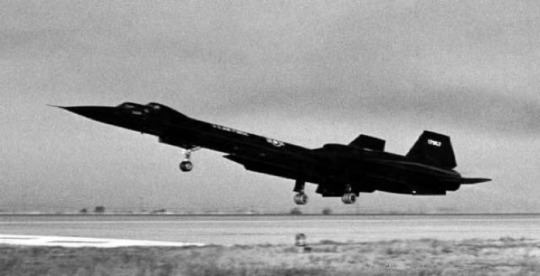
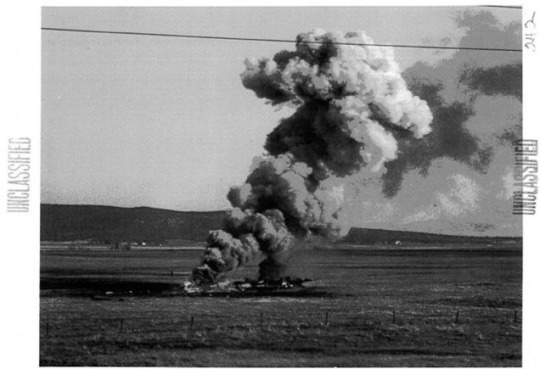
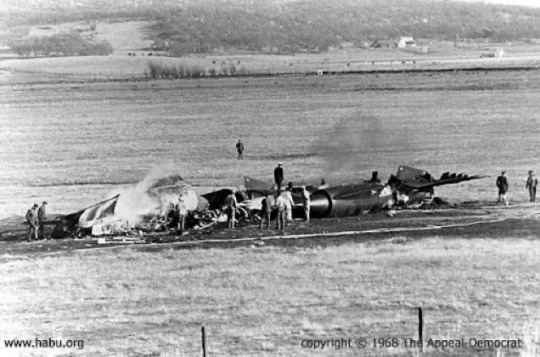

On this day…Lt. Col. Robert G. "Gray" Sowers on Thursday morning, January 11, 1968.
He was flying with 39-year-old Capt. David E. Fruehauf on his third flight in the Blackbird. The Blackbird would be flying under the radio callsign of “Aspen 21. Fruehauf was a native of Buffalo, New York, and had over 2,000 flight hours logged.
The pair briefed the flight plan, inspected the plane, and took off from Beale at 12:35 in the afternoon on what was planned to be a four hour flight.
A gentle left turn was then made to a heading of 280 degrees for a couple of minutes, followed by another left turn to 196 degrees and a descent into a refueling area near Lakeview VORTAC. But as the second turn was being prepped for, the left engine’s generator failed, some 37 minutes after the flight began.
SR-71 route "Busy Police #3" - UNCLASSIFIEDSowers and Fruehauf went to the emergency procedures checklist and accomplished the appropriate items. Sowers instructed Fruehauf to manually turn south towards Beale while he initiated a change to the astro-inertial navigation system to provide course
Sowers and Fruehauf continued straight ahead on the established course, maintaining their altitude with the existing engine throttle settings. They minimized all electrical requirements to conserve battery power.
About fifteen miles after the second generator failed, Aspen 21 began a shallow descent with both throttles slightly retarded and passed over Oroville, California, about 25 nautical miles north of Beale, at an altitude of roughly 10,000 feet.
A few moments later, the landing gear was lowered, causing the plane to slow to the needed 175-knots airspeed. This caused the plane’s nose to raise and created an angle of attack – the difference between the plane’s direction of travel and the mean chord line of its wings – of 10 degrees. The fuel shifted in the tanks to cause air to be sucked into the fuel boost pumps. The cavitated fuel flow forced the right engine began to lose power and flame out.
Out of Options...GET OUT!
But, being a unique, B-model, SR-71 posed a unique situation. In an ejection from a stock SR-71A, the Reconnaissance Systems Officer (RSO) in the back seat will eject first, followed shortly thereafter by the pilot. In the trainers, there is no RSO; the instructor sits in the back seat.
At 3,000 feet and some 8 miles from Beale AFB, Fruehauf complied with Sowers’ order and ejected. An instant later, Sowers followed his student into the sky via a Lockheed SR-1 ejection seat. After landing on the ground and removing his helmet and survival kit, Fruehauf found Sowers already on the ground, smoking a cigarette. My Dad told me that during test flight before they had to wear pressure suits that Gray used to smoke cigarettes in the cockpit but good for him he lived to be 92 go figure.😀both men were fine after the ejection and went on to have second careers. the result of the crash of 957 was that half of the trainer SR-71’s were now gone. SR 71 trainer the “C” model was later manufactured.
”Capt. David E. Fruehauf Fruehauf continued in the Air Force and eventually retired, settling in central Tennessee. In 2017, he was featured in a television commercial from Jack Daniels, showcasing residents of Lynchburg, Tennessee, as a resident who once “ejected from a SR-71 Blackbird and lived to tell about it.“ He can be spotted at the 0:28 mark, and aired during Super Bowl
Robert “Gray” Sowers retired from the Air Force, and became was the chief pilot for the country singer, Charlie Pride for 15 years. He saved the lives of all the band members by landing their critically damaged plane following a mid air collision caused by another plane.
Sowers died on December 1st, 2018, at his home in Tucson, Arizona. He was 92 years old. my Dad, Richard “Butch” Sheffield was crewed with Sowers at the very beginning of the SR 71 program in 1966. My Dad died eight days after his good friend Gray did.~Linda Sheffield Miller
@Habubrats71 via X
16 notes
·
View notes
Text
It Seems Like Nothing Changes
By Paul Cussen
October 1919

While Lloyd George’s government realise that Home Rule is not enough to satisfy the Irish, the Irish Committee of the British Government is recreated under heavy Unionist influence, notably through Sir Walter Long.
John McArdle, F Company, 1st Battalion, Dublin Brigade, Irish Volunteers loses the use of an eye during an exchange with British forces.
James Joyce leaves Zurich for Trieste. He writes to Harriet Weaver to say that he has found the manuscript of A Portrait… in the drawer of his desk, exactly where he had left it four years before. Not trusting the post-war postal system he divides the manuscript into four parts, posting each one separately, and promising that if any part did not arrive, he will write it out again for her.

(In July 1951 Harriet Weaver presented the manuscript to Frederick Boland as a donation for the National Library of Ireland. She was so impressed by Boland’s enthusiasm that she donated a portrait of the great man by Wyndham Lewis to the National Gallery of Ireland)
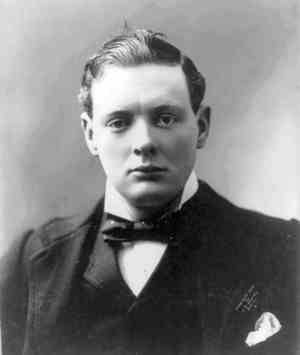
Winston Churchill condemns the IRA as ‘a gang of squalid murderers’ who have eluded capture.
D’Annunzio, the ‘John the Baptist of Fascism’, receives a cargo ship laden with military equipment. The Persia is captured by Giuseppe Giuletti and some volunteers who redirect it from its original destination of Vladivostock, where it is to supply the White Armies, to Fiume.
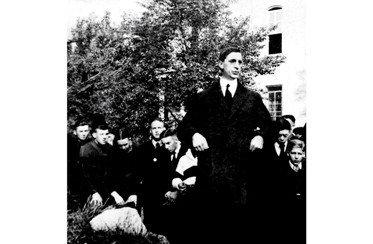
1-2 October
Dozens of doughboys shot at African-Americans and when police arrive they shoot at them during the Baltimore riot. Police reinforcements cause the soldiers to withdraw. In total six soldiers are arrested.
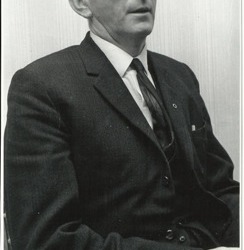
2 October
Seán 'ac Dhonncha is born in Carna, Connemara (d. 1996)
US President Woodrow Wilson has a stroke that leaves him partially paralysed.
3 October
John Boyd (Boyd Bradfield Upchurch) is born in Atlanta (d. 2013)
James M. Buchanan is born in Murfreesboro, Tennessee (d. 2013)

5 October
Private William Grenville dies of appendicitis in Cork.
Donald Pleasence is born in Worksop, Nottinghamshire (d. 1995)
5-6 October
61.6% of voters vote for prohibition (of spirits) in a referendum in Norway.

6-7 October
American marines and Haitian gendarmes repel an attack by Caco rebels under Charlemagne Masséna Péralte in the Battle of Port-au-Prince.
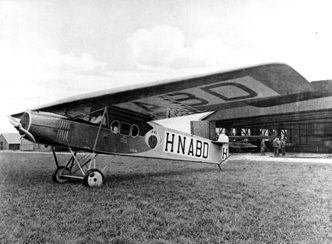
7 October
Koninklijke Luchtvaart Maatschappij N.V. (KLM) is founded and will become the first airline in the world to celebrate its centenary. The modified De Havilland DH-9B bomber pictured above was part of their London Amsterdam service with British Aerial Transport.
9 October
Constable Joseph Reynolds of the Dublin Metropolitan Police overpowers William Little who had just shot two “Asylum attendants and a private enquiry agent”.

10 October
Private W.J. Edwards dies of aenemia in Central Hospital, Cork aged 18.
11 October
Art Blakey is born in Pittsburgh, Pennsylvania (d. 1990)
11 Oct–18 Nov
Soviet forces halt the White forces advance on Moscow in the Orel-Kromy operation.
14 October
Aleksandar Stamboliyski is appointed Prime Minister of Bulgaria.

17 October
HMS Dragon is hit by two shells from a shore battery while taking part in an operation against German forces attacking Riga. Nine of the crew die and five are wounded.
RCA is created as a subsidiary to General Electric.

18 October
De Valera is made an honorary chief of the Chippewa in Wisconsin.
Pierre Trudeau is born in Montreal (d. 2000)
19 October
Detective Michael Downing of G Division (Dublin Metropolitan Police) is assassinated.
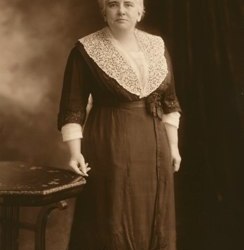
Anna Howard Shaw becomes the first female recipient of the US Distinguished Service Medal.
20 October
Ontario voters decide not to repeal prohibition in a referendum.
The man engine which transports miners underground at the Levant Mine in Cornwall fails. The rod which controls the movement breaks and men on the device plummet the 1,596-foot shaft. At least five of the 31 who die had served in the War.
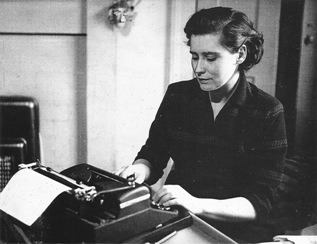
22 October
Doris Lessing is born in Kermanshah, Iran (d. 2013)
W. N. P. Barbellion (pen-name of Bruce Frederick Cummings), English naturalist and diarist, dies of multiple sclerosis (born 1889)
25 October
Jimmy Rudd is born in Dublin (d. 1985)
Six Republican prisoners (including Piaras Beaslaí) escape from Strangeways Prison.
Ireland and England draw 1-1 in front of a crowd of 30,000 in Windsor Park, Belfast.
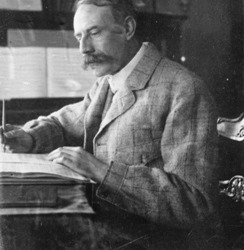
26 October
Edward Elgar’s Cello Concerto in E minor, Op. 85 premieres in Queen’s Hall, London.
President Wilson’s veto of the Prohibition Enforcement Bill is overridden.
27 October
James Joseph Magennis is born in Belfast (d. 1986)
Minister for Foreign Affairs, Count George Plunkett, reports ‘a steady progress’ in the development of Ireland’s foreign relations ‘in spite of all impediments’.
Mike Pepitone becomes the last victim of the Axeman of New Orleans.
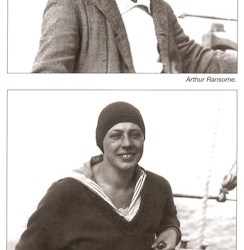
28 October
Arthur Ransome leaves Russia with his future wife Evgenia Petrovna Shelepina, who had been Trotsky's secretary.
30 October
Ella Wheeler Wilcox dies of cancer in Short Beach, Connecticut (b. 1850)
Laugh, and the world laughs with you; Weep, and you weep alone. For the sad old earth must borrow its mirth But has trouble enough of its own
‘Since I went to Ireland the only party delivering inflammatory speeches inciting to the murder of the servants of the Crown has been the Sinn Fein party, and so long as these speeches are likely to be delivered by these men I will prohibit them.’ -Sir James Macpherson in the House of Commons
31 October
Two units of the IRA attack the RIC barracks in Ballivor, Co. Meath killing 35 year old RIC Constable William Agar and seizing a revolver, five rifles and a large amount of ammunition.
Elsewhere in Co. Meath, Sergeant Matthews and Constables Griffiths and O’Shea at Lismullin RIC barracks repel an attack by about 26 Volunteers.
3 notes
·
View notes
Text
Summary Statement, 2nd Quarter, 1863 – 1st Tennessee Light Artillery
No surprise to Civil War students that Tennessee contributed troops to the Union cause. While the infantry and cavalry receive their due, the artillery batteries are seldom mentioned. And if we work from the summary statements for second quarter of 1863, that contribution was worthy only of a blank line:
1st Battery Tennessee Artillery…. but there were actually two such 1st Batteries in…
View On WordPress
#1st East Tennessee Light Artillery#1st Middle Tennessee Light Artillery#1st Tennessee Heavy Artillery (African Descent)#1st Tennessee Light Artillery#2nd Tennessee Heavy Artillery (African Descent)#2nd US Heavy Artillery (Colored)#3rd Ohio Infantry#3rd US Heavy Artillery (Colored)#Andrew Johnson#Battery A 1st Tennessee#Battery B 1st Tennessee#Camp Nelson KY#Charles H. Adams#Clarksville TN#Columbus KY#Emil Smith#Ephraim C. Abbott#Fort Pickering#Ignatz G. Kappner#Joseph Fowler#Memphis TN#Robert Clay Crawford#Rodgersville TN#Somerset KY#Zanesville OH
0 notes
Text
Zouave regiments, uniforms and tactics of the American Civil War, 1861-1862
Since its inception in 1783, the United States had been a primarily agricultural society. Large sectors of the economy were based heavily in the raising, harvesting and sale of a number of crops to parties both within and outside the country. Cotton, tobacco and wheat were chief among them, with other more perishable crops relegated to commerce within the United States’ borders. The south provided perfect soil for the production of these crops, and slave labor provided a free workforce with which to work the land. With no wages to pay, the land owners would increase their profit margins considerably. This system, known to history as the Antebellum Era or Plantation Era, created a kind of land-owning aristocracy. Wealthy cotton farmers who either were directly in positions of political power or greatly influenced those who were.
The arrival of Abraham Lincoln on the political scene disrupted life considerably, with his anti-slavery rhetoric. Tensions between north and south escalated, with the Antebellum aristocrats claiming federal government meddling in their personal lives. Many in the north understood slavery to be immoral, both refused to back down from the positions. On April 12th, 1861, the states of Texas, Tennessee, Arkansas, North Carolina, South Carolina, Mississippi, Louisiana, Florida, Alabama, and Georgia. Sections of Maryland and Kentucky would also join the rebels.
The Federal army was in little shape for a war on its own soil in early 1861. Uniforms had updated little since the Mexican-American War in the 1840′s, some units of the far-flung frontier hadn’t updated their uniforms since the War of 1812.

Uniforms were ironically non-uniform during this period. Each unit was responsible for providing their own outfits, with little regulation or oversight on what they looked like. Many regiments and battalions remained with the 1840′s pattern uniform as shown above. Many states did update their infantry uniforms, New York state reformed their standard uniforms to a steel grey color, which would largely be looted and then officially adopted by the rebels by 1863. The outbreak of war created new problems for the small US army, with Lincoln calling for 75,000 volunteers, vastly increasing the size of the standing force many times over.
However, as the United States had problems with uniforming their men, the rebel Confederate States had equal problems. A crippling lack of resources prevented them from providing uniform clothing to their men. Many rebel soldiers simply wore civilian clothing with military equipment over top. Looting from dead Federal soldiers became common, with more organized raids stealing large quantities of uniform components from depots at places like Harper’s Ferry.
From these newly created units on both sides, many of them adopted the flamboyant style of the French Zouaves. Red shirts, baggy trousers, fez caps and turbans became not uncommon on the battlefields of the early civil war. Some of these units included:
The 5th New York State Militia

14th New York State Militia “Red Legged Devils”

1st Louisiana Special Battalion, Co. B “Tiger Rifles” or “Wheat’s Tigers”

9th Louisiana Special Battalion

The outlandish uniforms were largely inspired by the French colonial infantry regiments of the same name. During the Second French Empire’s expansion into Algeria and Tunisia in the 1830′s, the French army encountered a wide variety of warrior peoples, primarily the warrior society of the Zwazwa. Fighting with a looser, more aggressive style than the French army had been used to, the Zwazwa took years to completely subjugate. During that time, the French public had grown endeared to them. Their particular style of clothing was adopted by colonial regiments stationed in Algeria, named the French pronunciation of the word. The Zouaves took the world by storm after that. Their uniforms became high fashion, their name and reputation was considered the last word in cool.
In a way, Zouaves filled the same cultural role back in the 19th century as, say, cowboys would today. Roughened, maverick, loose cannons. Tough as nails. Hard drinkers. Womanizers.
At the outbreak of war in the United States in 1861, units on both sides adopted both the look and the style of fighting. On top of being more flamboyant, Zouaves filled an important role in an army’s make-up; irregular specialist troops. They fought in looser, reactive groups, rather than the rigid lines infantry regulars did. While smaller in numbers, they could pursue objectives other infantry types couldn’t. The Louisiana Tigers, for instance, found a niche as cannon-killers. Swinging around the lines to knock out cannon batteries, allowing the rest of their force to approach unopposed by artillery. Naturally, this was a very dangerous job. The 1st Louisiana was obliterated at the Battle of Gaines Mill in 1862.
Acting as light infantry, the Zouaves were also armed with lighter, smaller weapons. Most Zouave brigades and regiments were armed with carbine-style “two-band” muskets. Self-provided pistols were common place as well, with no regulations on armaments beyond the standard-issue rifle.

Often not issued bayonets, Zouave regiments would often arm themselves with bowie knives or machetes for close-combat roles. After-action reports from early battles of the war claim Zouave units firing off a single volley, then immediately closing the distance to finish off the opposing unit in a violent melee. Many Zouaves, especially those of Louisianan origin, on average had a criminal record of some variety. Mainly gangsters or dock workers, the men of the Tiger Rifles were more at home in a punch-up than a shootout.
As the civil war escalated, Zouaves became less and less of a staple unit as both federal and rebel armies became more adept at handling situations. As American use of Zouave infantry died out, French use remained. The infantry type would remain in use within the French army all throughout the First World War and Second World War, only dying out after the Indochina War in the 1960′s.
Additional reading.
Cole, David. "Survey of United States Army, 1783 - 2006." Survey of U.S. Army. United States Armed Forces, 2007. Web. 15 Dec. 2017. <https://history.army.mil/html/museums/uniforms/survey_uwa.pdf>
Jones, Michael D. Making of a Louisiana Legend. New Orleans: Self-published, 2011. Print.
1 note
·
View note
Text
Allen West






Allen Bernard West (born February 7, 1961) is an American political commentator, retired U.S. Army Lieutenant Colonel, former member of the U.S. House of Representatives. A member of the Republican Party, West represented Florida's 22nd congressional district in the House from 2011 to 2013.
West was born in Georgia and joined the United States Army in 1983. He was deployed to Kuwait in 1991 and Iraq in 2003. In 2003, West was charged in an incident that involved the beating and simulated execution of an Iraqi policeman. After an Article 32 hearing was held, West accepted non-judicial punishment, was fined $5,000, and allowed to retire as a lieutenant colonel.
After leaving the military, he and his family moved to Florida, where he taught at a high school for a year and worked for a defense contractor, part of this time spent in Afghanistan as a civilian adviser to the Afghan National Army. West entered politics in 2008 as the Republican nominee for Florida's 22nd congressional district in 2008, losing to Democratic incumbent Ron Klein. In a re-match in 2010, he won the seat, coinciding with significant Republican gains in the 2010 midterm elections.
West took office in January 2011 as the first African-American Republican Congressman from Florida since Josiah T. Walls left office in 1876 near the end of Reconstruction. In Congress, West served on the Armed Services and Small Business Committees and was a high-profile member of the Tea Party Caucus and the Tea Party movement.
Redistricting due to the 2010 census resulted in West switching to Florida's 18th congressional district for the 2012 House elections. He lost by 2,146 votes to Democratic nominee Patrick Murphy in what would turn out to be the most expensive congressional race in U.S. history to date. After a recount extended Murphy's lead, the original results were certified and West conceded to Murphy on November 20, 2012. He is a contributor for Fox News and his first book, Guardian of the Republic, was published in April 2014.
Early life and education
Allen Bernard West was born in Atlanta, Georgia, to Elizabeth (née Thomas; 1931–1994) and Herman West, Sr. (1920–1986) on February 7, 1961. His father and older brother were both career military officers; West's father served in World War II, and his brother served in Vietnam. His mother was a civilian employee of the United States Marine Corps. Although both of his parents were registered Democrats, West has remarked that they raised him "very conservatively."
In the tenth grade, West joined the Junior Reserve Officers' Training Corps program and entered the United States Army in 1983 when he graduated from the University of Tennessee. West is the third of four consecutive generations in his family to serve in the U.S. Armed Forces. He later received a master's degree in political science from Kansas State University. He also earned a master of military arts and sciences degree from the U.S. Army Command and General Staff Officer College in political theory and military history and operations.
Military career (1983–2004)
Overview
West entered active duty on November 1, 1983, at Fort Sill, Oklahoma, where he completed the Field Artillery Officer's Basic Course (FACBOC). He then proceeded to airborne training at Fort Benning, Georgia, where he received his Parachutist Badge. West's first assignment was as an airborne infantry fire support officer and platoon leader, as well as battalion training officer for the 4th B.C.T.(Brigade Combat Team), 325th Airborne Infantry Regiment, 82nd Airborne Division at Fort Bragg N.C. under the command of Lt. Col. Thomas R. Needham at Caserma Ederle in Vicenza, Italy. In 1987, West was promoted to captain and attended the Field Artillery Officer's Advanced Course. Following graduation, West took command of B Battery, 6th Field Artillery Regiment, 1st Infantry Division. He served as the battalion task force fire support officer for 2d Battalion, 16th Infantry Regiment. As a member of the 1st Infantry Division he deployed for Operation Desert Shield and Operation Desert Storm.
After redeployment from Kuwait, West served as an Army ROTC instructor at Kansas State University from 1991 to 1994, becoming the U.S. Army ROTC Instructor of the Year in 1993. In January 1995 he was assigned to the 2nd Infantry Division Support Command as the assistant operations/combat plans officer. West was promoted to major before he attended the U.S. Army Command and General Staff College in 1997. Upon completion, he became the operations officer for the 18th Field Artillery Brigade before being assigned as executive officer of 1st Battalion, 377th Field Artillery Regiment. Afterwards, West served as an Army exchange officer at the II Marine Expeditionary Force at Camp Lejeune from 1999 to 2002 and was promoted to lieutenant colonel.
The culminating assignment of West's career was his assumption of command of the 2d Battalion, 20th Field Artillery Regiment, 4th Infantry Division on June 6, 2002. During the Iraq War in 2003, he deployed with his battalion until he was relieved of command by the Army following a use-of-force incident concerning an Iraqi policeman. At his Article 32 hearing, West admitted violating Army rules by holding the policeman captive, punching him in the face, conducting a mock execution and by firing a pistol held against the Iraqi's head. West was subsequently allowed to retire in 2004
Military decorations
West's awards and decorations include the Bronze Star; Meritorious Service Medal (two Oak Leaf Clusters); Army Commendation Medal (three Oak Leaf Clusters, one Valor Device); Army Achievement Medal (one Oak Leaf Cluster); Valorous Unit Award; Air Assault Badge; and the Master Parachutist Badge.
Iraq interrogation incident
While serving in Taji, Iraq, West received information from an intelligence specialist about a plot to ambush his unit. The alleged plot involved Yahya Jhodri Hamoodi, an Iraqi police officer. West had his men detain Hamoodi. Soldiers testified that in the process of detaining Hamoodi, he appeared to reach for his weapon and needed to be subdued. Hamoodi was beaten by four soldiers from the 2/20th Field Artillery Battalion on the head and body. West then fired his pistol near Hamoodi's head, after which Hamoodi provided West with names and information, which Hamoodi later described as "meaningless information induced by fear and pain." At least one of these suspects was arrested as a result, but no plans for attacks or weapons were found. West said "At the time I had to base my decision on the intelligence I received. It's possible that I was wrong about Mr. Hamoodi."
West was charged with violating Articles 128 (assault) and 134 (general article) of the Uniform Code of Military Justice. During a hearing held as part of an Article 32 investigation in November 2003, West stated, "I know the method I used was not right, but I wanted to take care of my soldiers." The charges were ultimately referred to an Article 15 proceeding rather than court-martial, at which West was fined $5,000. West accepted the judgment and retired with full benefits as a lieutenant colonel in the summer of 2004. Asked if he would act differently under similar circumstances, West testified, "If it's about the lives of my soldiers at stake, I'd go through hell with a gasoline can." At his hearing, West said that there were no ambushes against American forces in Taji until he was relieved of his leadership post a month later. After West's retirement he received more than 2,000 letters and e-mails offering him moral support. A letter supporting West was signed by 95 members of the U.S. Congress and sent to the Secretary of the Army.
Post-military career (2004–2007)
After retiring from the Army, West and his family moved to Florida. He taught U.S. history and coached track and field at Deerfield Beach High School for a year. He then spent two years working for Military Professional Resources Inc. (MPRI), a defense contractor. While with MPRI, West was positioned in Kandahar, Afghanistan. In that capacity, he was an adviser to the Afghan National Army.
U.S. House of Representatives
Elections2008
In 2006, 25-year incumbent Republican E. Clay Shaw, Jr. was defeated by Democrat Ron Klein in Florida's 22nd Congressional District. Allen West entered politics in 2008 to regain the lost House seat, challenging freshman incumbent Klein. West received the Republican nomination without opposition. However, he lost to Klein by a margin of 9.4% of the votes. The official results were Klein with 169,041 votes (54.7%), West with 140,104 votes (45.3%), and write-in candidate Michael Prysner with 6 votes.
2010
West spoke at the Conservative Political Action Conference on February 20, 2010, and was endorsed by former Alaska Governor Sarah Palin. West was one of 32 African-American Republican candidates for Congress in 2010. He said he supported the Tea Party movement and rejected the notion that the movement was motivated by racism, saying the accusation was a creation of liberal critics and the news media. West has been described as a "tea party star" became a member of the congressional Tea Party Caucus in February 2011.
In September 2010, the Florida Democratic Party produced a flyer that contained West's unredacted Social Security number. While the party called it an "oversight" and offered to pay for identity theft protection, West harshly condemned the flyer for exposing his family to identity theft.
West defeated incumbent Ron Klein by a margin of 8.8%. West, along with newly elected Tim Scott, were the first African-American Republicans in Congress since J.C. Watts retired in 2003. West raised $5.4 million for his campaign, while his incumbent opponent raised $2.5 million. According to West, "...over 97 percent of our donations have come from individual contributions."
2012
West raised more than $1.5 million in the 2011 second quarter to support his 2012 reelection bid. The National Journal's Cook Political Report in 2011 named West one of the top 10 Republicans most vulnerable to redistricting in 2012.
Redistricting made the 22nd, which already had a modest Democratic lean, even more Democratic. West faced the prospect of running against West Palm Beach mayor Lois Frankel in the general election. On February 1, 2012, West announced that he would run for reelection in the neighboring 18th District. That district had previously been the 16th, represented by fellow Republican Tom Rooney. However, Rooney opted to seek reelection in the newly created 17th District, a move that was considered likely to dramatically improve West's chances of reelection, although it was still a competitive race.
In the new district, West received a primary challenge from Martin County Sheriff Robert Crowder. West did not debate Crowder and said "debating an uninformed opponent would waste voters’ time". Incumbent West defeated Crowder in a landslide, receiving 74.4% of the vote.
His general election opponent was Democrat Patrick Murphy, a political newcomer and a Republican until 2011. The campaign featured several negative ads, including one released by American Sunrise PAC that was extremely critical of West's policies and depicted him in violent cartoon action against several individuals. West issued a statement condemning the ad, stating that it "plays on stereotypes" with the goal of diverting Americans from more pressing matters at hand such as high unemployment. He claimed the ad was released by the family of his opponent. The campaign manager of his opponent, said the ad was from a third party and therefore held no liability for it. After primary opponent Crowder endorsed Murphy, a spokesman of the West campaign said "Crowder is a Democrat and a sore loser. I’m shocked he waited this long. Perhaps Crowder hopes to continue cozying up to local Democrats so he can be their nominee against Allen West in 2014."
Initial vote counts showed Murphy defeating West by a narrow margin of 2,000 votes. West did not concede, citing irregularities in St. Lucie County where some early ballots may have been counted twice. Florida state election officials unofficially certified Murphy as the winner, A partial recount of early ballots cast between November 1 and 3, 2012, in St. Lucie County slightly decreased the margin separating the candidates, and the West campaign sought further recounts. West said that if the final results show a loss, he would not cling to his title as a member of Congress, but wanted to ensure a fair election was carried out, raising the potential of a protracted legal battle. As of the November 18 state deadline, the St. Lucie County election officials had not completed a recount of all of the early ballots, and so the previously submitted vote count which showed Murphy as the winner by 2146 votes was submitted to the state election officials. The West campaign conceded the election on November 20, 2012. Meanwhile, Frankel went on to victory in the 22nd.
Tenure
There are those who will hate your own country, America, regardless of the self-evident truths. To you I say that life just does not get any better than the 'Land of the all night IHOP' … and if you truly hate America so much, you are also free to find another home. There is surely an illegal immigrant who will be happy in yours.
West's rhetoric won him both support and condemnation from differing groups along the American political spectrum. Members of the conservative movement viewed him as a "torch bearer" and "conservative icon," with Sarah Palin and Ted Nugent both suggesting him for vice president, and Glenn Beck supporting him for president. In January 2013, U.S. Representatives Paul Broun (R-Georgia) and Louie Gohmert (R-Texas) both voted for West as Speaker of the House, even though he was no longer a member of Congress. Some of his statements include calling President Barack Obama "an abject failure", ordering both pro-Palestinian demonstrators and the views of "chicken men" Democrats to "get the hell out" of the United States, opining that drivers with Obama bumper stickers are "a threat to the gene pool", and pronouncing that African American Democrats are trying to keep African Americans "on the plantation", while casting himself as the "modern-day Harriet Tubman" ferrying them to rescue. In a critical summation of West's style, the liberal magazine Mother Jones opined that "[for West] every sentence is a proxy war in the larger struggle between patriots and the 'people in this world that just have to have their butts kicked.'".
In January 2011, West joined House Foreign Affairs Committee chairwoman Ileana Ros-Lehtinen (R-FL) in condemning the official flying of a Palestine Liberation Organization flag in Washington D.C. West said that the raising of the flag is "an attempt to legitimize an organization with a known history of terrorist actions". In February, West described Michael Ledeen as one of his "foreign policy heroes", and implored his followers to read Saul Alinsky's Rules for Radicals to "understand what they're up against." Other authors West has cited in helping him shape his worldview include philosopher John Stuart Mill and Union Army General William Tecumseh Sherman.
On June 2, 2011 Allen West wrote a letter to President Obama urging him to grant clemency to Jonathan Pollard. Mr. West wrote, "After serving 26 years behind bars, Jonathan Pollard's health is deteriorating, as is his wife's. If we can consent to the release by the British of the Lockerbie bomber back to Libya due to health concern, how can we justify keeping Mr. Pollard behind bars when his crimes were clearly not as serious as a terrorist who murdered hundreds of Americans?" Pollard was released on November 20, 2015, in accordance with federal guidelines in place at the time of his sentencing. Anne Pollard, his ex-wife, said "No one helped him. No government reduced his sentence by even one day."
West attempted to cast his work overseas in historical terms, theorizing that America is following in the footsteps of Charles Martel at the Battle of Tours, or the 300 Spartan Hoplites at the Battle of Thermopylae, in defending Western civilization against Muslim threats from the Middle East. In speaking on what he believed to be Islam's proclivity for violence, West remarked that "Something happened when Mohammed enacted the Hijra and he left Mecca and he went out to Medina, it became violence." Because of this view, in February 2011, West cited the threat of "radical Islamic terrorists" as his motivation for voting to extend provisions of the Patriot Act; He voted against another extension in May 2011. When asked during an interview with The Shalom Show how he would work with others "like Keith Ellison, who supports Islam," West stated that Ellison, a Minnesota representative and practicing Muslim, represents the "antithesis of the principles upon which this country was established." West later argued that his initial comment was misconstrued. He said the comments were "not about his Islamic faith, but about his continued support of the Council on American-Islamic Relations (CAIR)." In a Boynton Beach Town Hall meeting, West told the Miami leader of CAIR that "I will always defend your right to practice a free religion under the First Amendment, but what you must understand, if I am speaking the truth, I am not going to stop speaking the truth. The truth is not subjective."
On July 19, 2011, West sent an email to Democratic representative and Democratic National Committee chairwoman Debbie Wasserman Schultz in response to comments directed at him in a speech the congresswoman made on the floor of the House of Representatives after West had departed the chamber. West's email, which he copied to members of House Democratic and Republican leadership, characterized Wasserman as "the most vile, unprofessional, and despicable member of the US House of Representatives", said that she was "not a lady" and asked that she focus, instead, on her own congressional district. This is a long-standing dispute that West says "dates back to the disgusting protest you ordered at my campaign headquarters, October 2010 in Deerfield Beach."
At a town hall meeting in Palm City, Florida on April 11, 2012, West was asked by a man in the audience, "What percentage of the American legislature do you think are card carrying Marxists or International Socialists?" West responded that "there's about 78 to 81 members of the Democrat Party that are members of the Communist Party." When asked to name them, he replied "It's called the Congressional Progressive Caucus."
Committee assignments
West was appointed to the House Armed Services Committee and the Small Business Committee.
Committee on Armed Services
Committee on Small Business
Subcommittee on Emerging Threats and Capabilities
Subcommittee on Contracting and Workforce
Subcommittee on Investigations, Oversight and Regulations
Caucus memberships
Republican Study Committee
Tea Party Caucus
Congressional Black Caucus
When West joined the Congressional Black Caucus (CBC) on January 5, 2011, he became the first Republican to join the CBC since former Congressman Gary Franks of Connecticut retired in 1997.
Post-congressional career
Work with Fox News
On May 16, 2013, Fox News announced it had hired West as a contributor to offer political commentary during the network's daytime and prime time shows. In a statement, Executive Vice President of Programming Bill Shine said that West's "congressional and military experience along with his fearless approach to voicing key issues will provide a valuable point of view to the FOX News lineup."
Following the Charleston church shooting in 2015, South Carolina Governor Nikki Haley called for the Confederate Battle flag to be removed from a memorial outside the state capital. West referred to the debate over the flag as a "manufactured crisis" invented by liberals to distract from black-on-black violence.
On December 9, 2016, West's official facebook page posted a call for the extermination of Muslims. The editor and chief of allenbwest.com later removed and apologized to his readers for posting inappropriate content and stated West had no part in the post.
National Rifle Association
West is a Life and Endowment Member of the National Rifle Association (NRA). In May 2016, he announced that he had been elected as a member of the NRA Board of Directors for a three-year term.
Sunset Advisory Commission
In September 2015 West was nominated to the Commission (which oversees the need for Texas state agencies) as the Texas Senate appointed public member.
Personal life
West was first married to Gayle Mosby. Later, West married Angela M. Graham on December 24, 1989. She holds a Ph.D. in education from Kansas State University, and received a gubernatorial appointment to the board of trustees of Florida Atlantic University. They have two daughters. West and his family moved to Texas after he became CEO of the Dallas-based National Center for Policy Analysis in January 2015.
He is a certified master scuba diver, motorcycle enthusiast and honorary member of the Blue Knights International Law Enforcement Motorcycle Club. He was a co-host for Troopathon 2013.
Wikipedia
1 note
·
View note